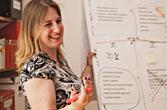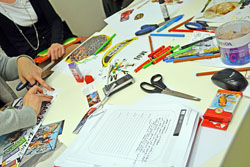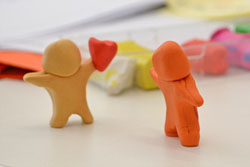Education doesn’t always have to be boring

Getting an education doesn’t always need to be boring or just pure theory without a clear link to everyday life needs. There are courses where you can learn useful and interesting information that you will be able to utilize the very next day at work. Courses, where you can meet interesting people who have a similar experience as you have. Courses, where you will be drawn into the teaching process so that you won’t even realize how fast time goes. EKS offers such courses. Eva Kavková, supervisor of our vocational program, is sharing her tips on how to prepare truly practical trainings.
What do I focus on when preparing a course?
We all know it, time is short, there is always work to do and we need to measure every minute. We don’t want to sit for hours listening to monotonous lectures, we don’t need to look at an umpteenth PowerPoint presentation, so full of text it flows out from all sides, and whose author could anesthetize a bull just by talking. We all know this feeling when your eyelids become heavy and a third coffee won’t help.
 I have experienced such situations countless times. So when preparing a course, I always remember how I felt in that situation, and make sure it never happens in my class. I base my work on what really caught my attention and what I can actually use in my work. I imagine myself going to my classes as a participant, I wouldn’t want to be bored and would want to learn something useful. I have little time and so I always focus on what has a practical impact on my work. It doesn’t matter whether it is a course on teaching skills, time management or staff management, the principles are the same for all:
I have experienced such situations countless times. So when preparing a course, I always remember how I felt in that situation, and make sure it never happens in my class. I base my work on what really caught my attention and what I can actually use in my work. I imagine myself going to my classes as a participant, I wouldn’t want to be bored and would want to learn something useful. I have little time and so I always focus on what has a practical impact on my work. It doesn’t matter whether it is a course on teaching skills, time management or staff management, the principles are the same for all:
Principle no. 1: the experience of participants
Participants play a key role in our courses. Each has their own experience, and we base the training on that. We don’t just teach theory but we boost and blend the experience of those who come to us. Sharing different experiences and contexts is always interesting. And not just in my personal experience, but also judging from the feedback from those who took the classes.
 Principle no. 2: the practical use of what I learn in the course
Principle no. 2: the practical use of what I learn in the course
The second basic element in our courses is practicality. We always base trainings on the participants’ specific cases, we solve their model situations and work with documents, which they can keep and use the very next day in their own life. Whether it's a draft scenario for the lesson they teach, tips on coping with problematic clients or useful tools for planning work.
Principle no. 3: inspiration and new ideas
In addition to practicality, we also want to inspire our participants and give them new ideas for their work. Our resources are very diverse, ranging from theoretical basics in the field of adult education and pedagogy (we are members of the Association of Adult Education Institutions), experience and know-how acquired abroad (as trainers and as participants in international partner projects) or a bottomless well of information from our library and database of electronic resources. We use it all in our trainings. We enjoy teaching and we believe that it is obvious in our lessons.
If you are looking for inspiration for your work as a trainer, take a class in teaching skills!



fb
Instagram
LinkedIn
Youtube